PPC Keyword Analysis
PPC, or pay per click, keyword research is essential for your PPC campaign. Selecting the best keywords can provide you with the most clicks and conversions. PPC keyword research is a combination of science and an understanding of the needs of your customers. You need to use the best tools to help determine which terms your potential customers are using for search queries. This is the most effective way to ensure your ads appear in the right place at the right time.
When searches are conducted for the types of services or products you offer, your keywords need to be among them. Your PPC keyword analysis begins with the landing page for your website you intend to use to link to your ads. Scan every page to find your best possible keywords. Your website should have a relevant and well-written copy with enough material for a fairly comprehensive keyword list. Your keywords should be directly related to your services or products.
What is Google Ads?
The most popular advertising system based on PPC is Google Ads. This system was originally called Google AdWords. You can use this ad platform for the creation of ads appearing on Google properties such as the Google search engine. Google Ads is based on a pay per click model. You bid for keywords with other advertisers. You then pay every time a consumer clicks on one of your ads. Every time a consumer conducts a search, Google selects a winner from their pool of advertisers.
When your ad is selected, it appears on the search results page. There are numerous factors used to select a winner including the size of your keyword bids and the relevance and quality of your keywords. This is a valuable space for your ad because when a potential customer clicks, you have a fairly good chance of making a sale. One of the most important concepts for your ad being selected is your ad ranking. This metric is calculated through the multiplication of two key factors.
The largest amount you will spend on advertising is your CPC bid. The quality of your landing page, relevance and click-through rate is your Quality Score. When you are a winning advertiser, the system enables potential customers to see your ads at a cost appropriate for their budget. PPC ads are similar to an auction. The best way to succeed is to understand how to find the best keywords for PPC. If you are still a bit confused here is a chart that might help:
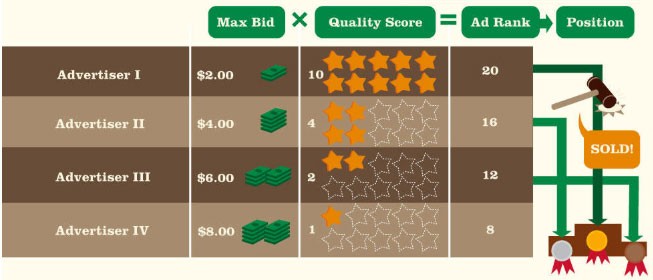
(Image Credit: WordStream)
Organizing PPC Keywords
Your keywords should be organized according to specific terms to help ensure the best possible relevance including:
- Generic terms are eCommerce keywords relating to your services or products.
- Brand terms are ad keywords including your trademark and brand name.
- Competitor terms are competitor brand names offering services and products similar to yours.
- Related terms do not relate directly to what you are offering. These are terms your potential customers use to search for what they are looking for.
A good example is if you are conducting keyword research for PPC campaigns to advertise women’s shoes. You need to consider what your potential customers are searching for including the specific words and searches entered into the search box. You should begin with broader keywords, then become more specific. A PPC keyword example is:
- Shoes
- Women’s Shoes
- Women’s High Heel Shoes
- Women’s Black High Heel Shoes
We can set-up and optimize your Google Ads for you but let’s also test your website’s SEO potential. Takes 60 seconds!
Paying for traffic is an important way for many businesses to grow but ranking naturally in Google for your important keywords is free. While Diib helps 1000s of businesses grow with Google Ads management, Diib is also one of the best SEO tools in the world and uses the power of big data to help you quickly and easily increase your traffic and rankings. Diib will even let you know if you already deserve to rank higher for certain keywords. As seen in Entrepreneur!
- Over 500,000 global members
- Keyword and backlink monitoring + ideas
- Built-in benchmarking and competitor analysis
- Easy-to-use automated SEO tool
- Speed, security, + Core Vitals tracking
- Too busy for SEO? Diib’s Growth Experts can set-up and optimize your ads!
Used by over 500k companies and organizations:
Syncs with 
Types of PPC Keywords
You need to be aware that placing a bid on one of your competitor’s brand terms is generally expensive. You should have a comfortable budget or you will run out of funds fairly quickly. If you intend to run this type of campaign, you need to be certain your return investment is worth the money before proceeding. Your keyword list should include synonyms and variations. In some instances, search engines will make the connotation between terms including women’s shoes and high heel shoes. For example, here is a search made for women’s high heeled footwear getting results for women’s high heeled shoes, sandals, and pumps:
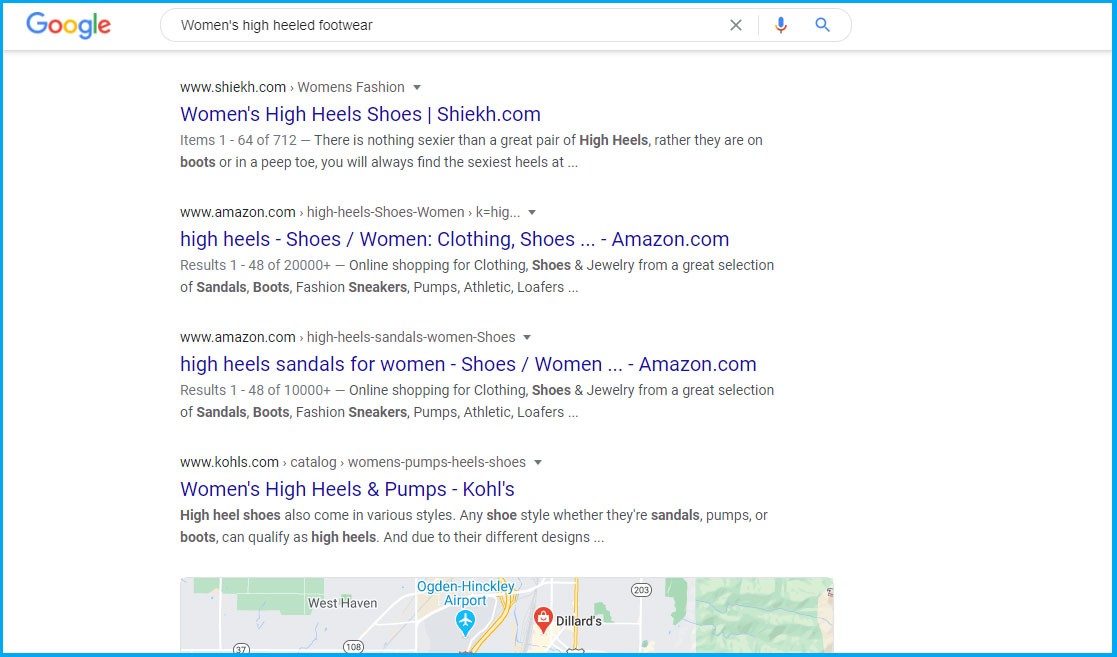
At other times, search engines will not be aware that these terms represent the same product. For this reason, you should include both terms. If your match type is set to exact, you should include plurals, abbreviations and short forms. Using the example of women’s shoes, your variations should include:
- Women’s shoes
- Women’s footwear
- Women’s high heeled shoes
- Women’s high heeled footwear
- Women’s black shoes
- Women’s black footwear
PPC Keyword Specificity
Specificity is important when you consider how to find the best keywords for PPC. Including short phrases, single words and broader words are often beneficial due to the higher search volume. If you choose too broad of a term, you can lose relevance. A good example is including the word shoes. This includes men’s shoes, children’s shoes, athletic shoes, etc. If you use a long-tail phrase such as black high heeled women’s dress shoes, you are less likely to have consumers entering this specific phrase. For instance, here is a company that used all of those keywords:
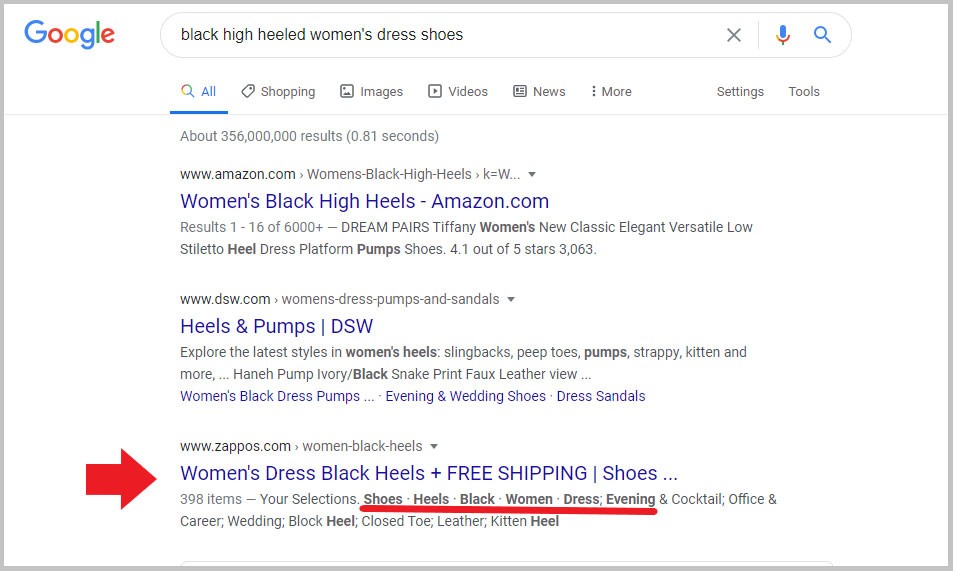
The consumers entering your specific phrase will probably click on your ad because you are offering exactly what they are searching for. This significantly increases your chance of making a sale. Long-tailed keywords will cost you less because they are not as competitive. Your keywords need to be related to your service or products to attract customers with an interest in what you are offering. Another good example is if you are selling cat toys. You can use topics often searched for by cat owners including:
- Cat health issues
- Cat accessories
- Cat sitters
- Cat breeds
PPC Keyword Concatenation
You can also use the concatenation technique to expand your lists of keywords quickly. This involves merging different columns of words using a PPC keyword research tool such as MergeWords or the Microsoft Excel Concatenate tool. Each column has a different modifier such as color, type and size. A list including all permutations of your terms will be generated by your tool. You need to realize some searchers do not speak (or spell) English perfectly resulting in misspelled words.
You Might Also Like
Christmas is often misspelled as Chritmas, Chrismas, Crismas, etc. For this reason, you want to consider including common misspellings of your keywords as well as potential alternates. A good example is the word Hannukah can also be spelled as Chanukah, Hannuka and Hanukah. If you intend to use DKI or dynamic keyword insertion in your ad, you do not want to use misspelled words in your ad group. Your ad will appear unprofessional with the use of misspelled keywords.
This step is not as important as in the past because Google has significantly improved its ability to recognize common misspellings. Search engines have also gained the ability to comprehend long strings of words. This is partially due to the increasing number of consumers conducting voice queries through mobile phones. You need to consider these individuals while performing your PPC keyword analysis by including search terms from both keyboards and voice queries because they are different.
One of the more typical traditional searches is Chinese Restaurants in Los Angeles. If the same person is using a mobile device for a voice query, they might ask what is the best Chinese restaurant in Los Angeles? The consumer might also ask where can I find Chinese food in Los Angeles? This is the reason including several different variations is important such as:
- How do you__?
- What is__?
- How can I__?
- Where can I__?
- Where to get__?
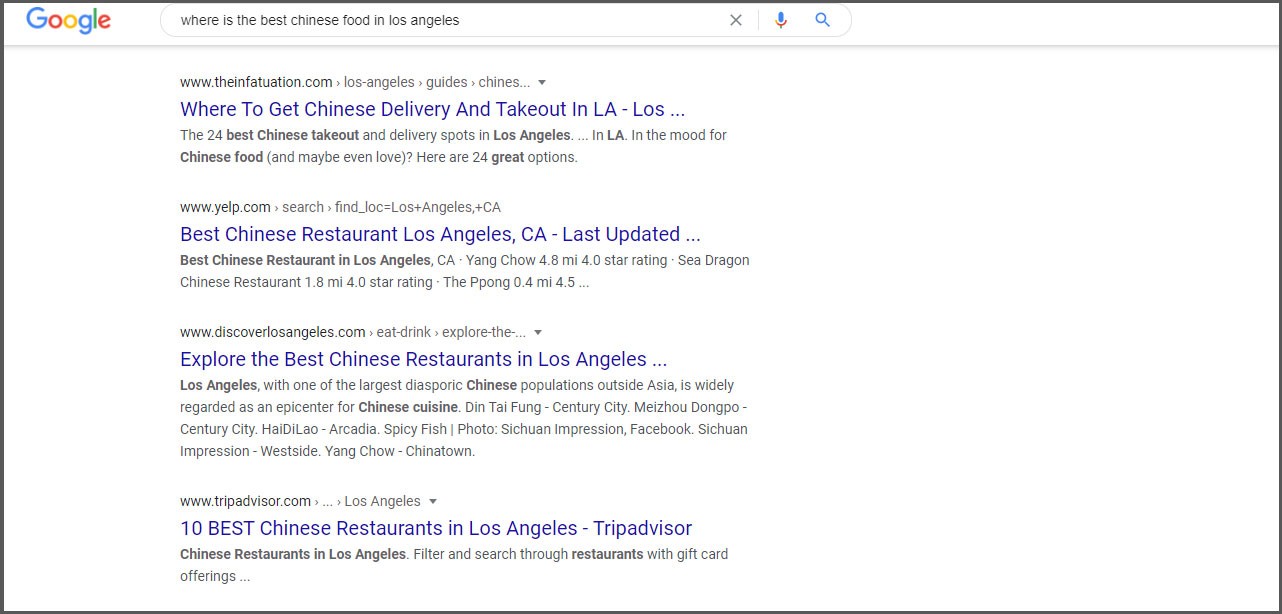
PPC Keyword Research Tool
You can use a PPC keyword research tool to refine and expand your keyword list. You should have a list of terms you intend to bid on before you begin. Once you have compiled your list, you can use a keyword research tool to figure out which keywords to eliminate and the best keywords to keep. Your gut intuition works well for many endeavors but not for keywords. A good tool helps you find the terms consumers are actually entering into the search engines.
There are a lot of keyword tools available offering you insights into the most popular keywords including Google Keyword Planner and the Keyword Suggestion tool from WordStream. There are variations for every tool with the most important stat being search volume. A higher search volume indicates the term is searched for most often every month. A competition rank is assigned by the Keyword Planner from Google Ads of low, medium or high. For example, here is WordStream’s keyword tool:
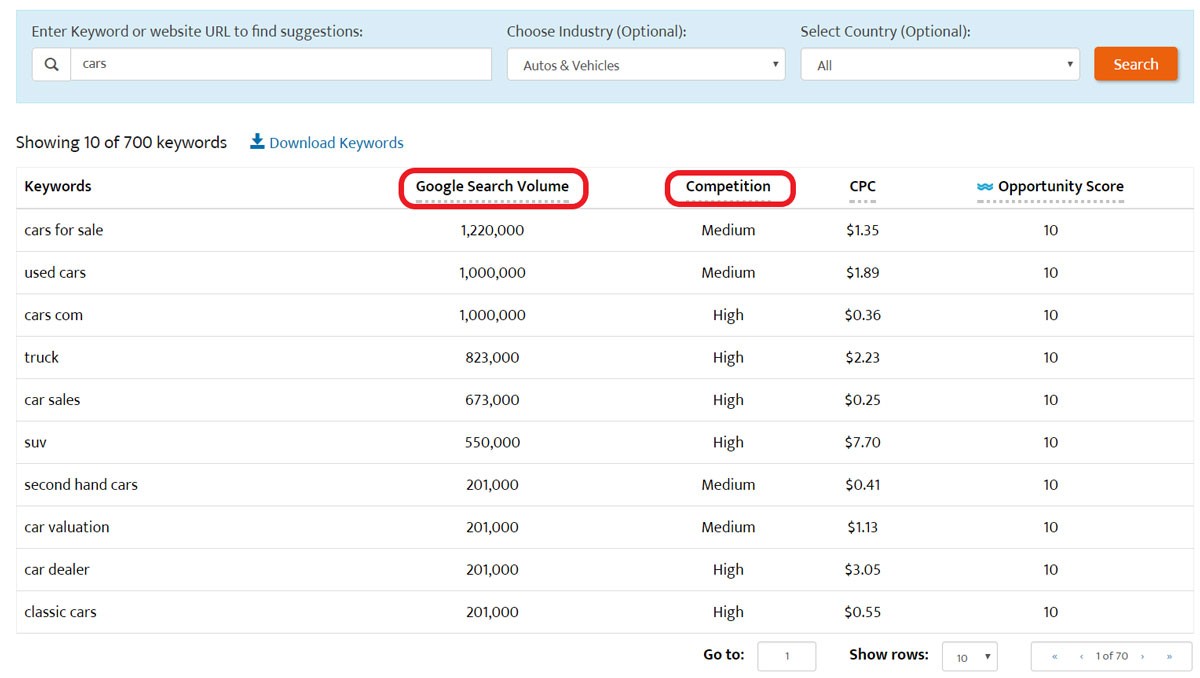
(Image Credit: WordStream)
When the competition rating is higher, more advertisers are placing bids using these terms. If you want your ad to appear in one of the top positions, you will need to make a larger investment. The terms at the end of the list have a lower search volume but there is less competition. If you have a smaller budget, you should consider this option. When you consider how to find the best keywords for PPC, look for low competition keywords with a high volume.
These keywords will drive a lot more traffic to your website. Certain PPC keyword research tools such as the Keyword Planner offer suggestions for other keywords not included in your original list. You can also find free keyword tools online with similar options. You start by entering your keyword. You then receive a variations list from the tool. If your keywords have a lot of competition, the chances are good you will spend your budget too quickly. For instance:
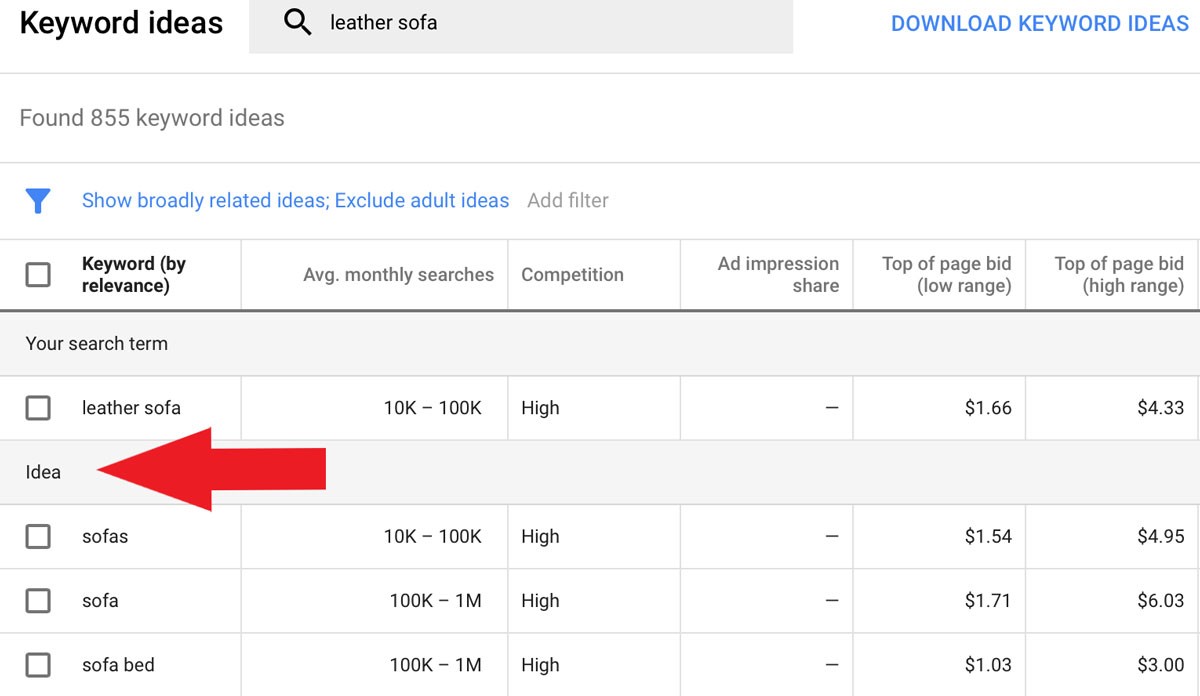
(Image Credit: Disruptive Advertising)
You should eliminate these keywords from your list in addition to those with either no or very little search volume. Keyword tools are beneficial because they offer you the ability to remove poor or low ranking keywords. You can also find new terms that never entered your mind.
Organizing PPC Keywords
Once you have compiled a fairly impressive list of keywords, you need to start sorting your list. Your list should include small groups of targeted keywords with close relations. Your keyword groupings will correspond to the ads you place through Google, Bing, etc. If your listing of services or products is straightforward, the structure for your website should be mimicked by your ad groupings. If you are selling cat food, consider a campaign similar to:
- Brand: ABC Cat Food
- Brand: DEF Cat Food
- Brand: GHI Cat Food
- Generic: Cat Food
- Generic: Cat Food/Beef
- Generic: Cat Food/Fish
- Generic: Cat Food/Chicken
- Generic: Kitten Food
Look at the variety of options you can use with the keyword “cat food”:
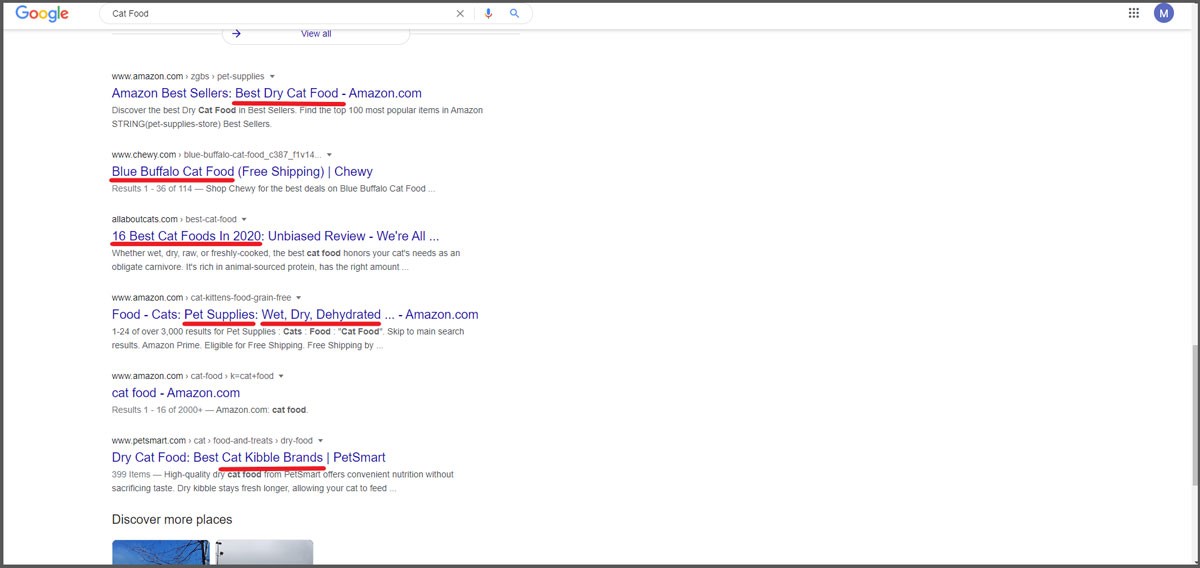
Ensuring you ad groups are more focused and tighter will make numerous factors much easier including:
- When necessary, expanding or cutting down your keyword lists
- Measuring each keyword’s performance
- Creating extremely relevant and specific pay per click ads.
The last factor is extremely important. Tightly organized and smaller ad groups will increase the benefits of your PPC ads. When your pay per click keyword research and campaigns have higher relevance and good organization, your Quality Scores will be higher. The result is paying less for every conversion and click and improving your ad rankings. Ensuring your PPC campaign is healthy will result in a healthy Quality Score. The best way to improve your scores is with a strong organization for your keywords.
Adding Negative Keywords
When you are compiling your keyword list, do not forget to include negative keywords. These search terms are used by consumers you do not want to see your ads. This is a critical aspect of every PPC campaign because it ensures your targeting remains relevant and controls your costs. The main purpose of negative keywords is to stop both your brand and ads from appearing for offensive and irrelevant search queries. A good example is if you are selling high-quality jewelry.
You only want your ad targeting affluent consumers. This means your negative keywords will include free and cheap. This will stop your ad from showing next to these terms through your negative keyword list. You also do not want to include any keywords giving a similar impression with no relevance for your business such as plastic or wooden beads when you are selling high-quality jewelry. This eliminates the need to pay for the majority of ads not beneficial for your business.
Tips for Negative Keyword Research for PPC Campaigns
- Examine your search query reports carefully. This will enable you to determine what consumers are searching for when your ad appears. If there are keywords in your report you are certain do not suit your business, you can use them as negative keywords before you have to pay for another ad due to these specific terms.
- Determine negative match types for your business. The traffic you block is significantly impacted by the negative keywords you assign according to your match type. The general rule is using broad match negatives. This will disqualify all queries using your negative keyword such as cheap. You can use exact negatives and phrase match negatives to eliminate specific queries using your negative long-tailed keywords.
- Before taking your PPC campaign to live, keyword research for PPC campaigns will offer additional options for negative keywords. The more negative keywords you have before going to live, the more money you will save from the start. You can find a wide variety of tools online to help locate potential negatives according to your current choices for keywords.
- You can always use multi-level negatives. There is a good chance certain negatives will be identified as an appropriate choice for multiple campaigns or ad groups.
- Do not take your negative keywords to extremes. Even though they are important for your PPC campaign, using negative keywords incorrectly can damage your impression volume and cause significant harm to your account. Before setting each negative keyword, conduct a search for the term to make certain it will convert well for your website.
We hope that you found this article useful.
If you want to know more interesting about your site health, get personal recommendations and alerts, scan your website by Diib. It only takes 60 seconds.
Pay Per Click Keyword Research
Despite the time necessary to conduct research for PPC keywords, your time will be well-spent. You will build your PPC campaign with the use of keywords. The most successful advertisers on Google Ads are consistently refining and increasing their keyword lists. Performing keyword research only once for your initial campaign is a mistake. You will most likely miss hundreds of thousands of highly relevant, low-cost, long-tail and valuable keywords capable of increasing traffic to your website. An effective list for PPC keywords should be:
Exhaustive
The research you conduct for your keywords needs to contain the most frequently searched for and popular terms for your specific market niche. Long-tailed keywords are less common and more specific. They account for most of the traffic driven by searches. Since these keywords are not as competitive, they are less expensive.
Relevance
You do not want to cover the costs of website traffic not relevant to your business. Targeted keywords will result in a higher PPC rate, increased profits, and an effective PPC rate. Make certain the keywords you decide to bid on have close relevance to the service or products you are selling.
Expansive
Your campaigns should be consistently expanded and refined. This will create the ideal environment for a constantly adapting and growing keyword list.
Diib®: PPC Keyword Research at Your Fingertips!
With the proliferation of keyword research tools filling the internet, it becomes even more important to find just the right one for your needs. The Diib keyword research tool backs each suggestion with relevant data and statistics. We also give you insights into the keyword strategies of your top 6 competitors. Here are some of the features of the Diib Digital Dashboard we’re sure you’ll love:
- Keyword, backlink, and indexing monitoring and tracking tools
- User experience and mobile speed optimization
- Bounce rate monitoring and repair
- Social media integration and performance
- Broken pages where you have backlinks (404 checker)
- Technical SEO monitoring, including your PPC campaigns
Click here for your free scan or simply call 800-303-3510 to speak to one of our growth experts.
FAQ’s
This means finding just the right keywords to help your PPC campaigns convert better. With the above advice, you should be a research pro in no time.
In 2018, the average small to medium-sized business spent anywhere between $9,000-$10,000 on PPC per month. That being said, it depends on the keywords you choose and the industry involved. Prices for PPC are always changing.
In general , SEO can have a better ROI than a PPC campaign and, in the long run, will create more traffic and brand awareness than paid ads.
CPC, or cost-per-click, can be high because advertisers in certain industries are willing to pay more for each click. For example, one conversion for a law firm could be hundreds of thousands of dollars in revenue, thus, it isn’t a big deal to spend more per click.
These are hidden terms that Amazon can add to a product listing to increase its visibility. While not visible to the searcher, they count in the search terms that you may not have been able to add to the actual product listing.



